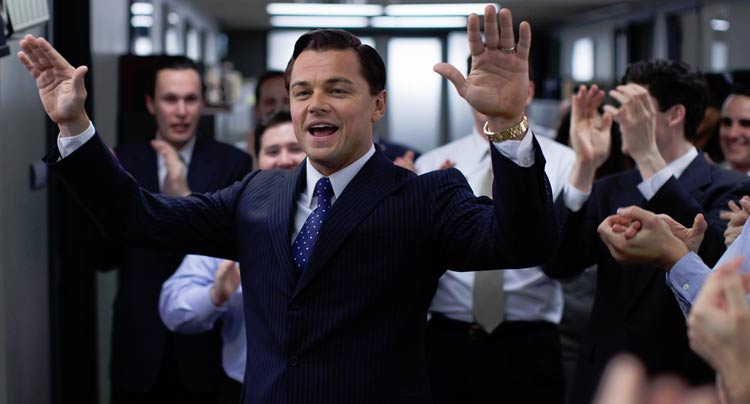
Scorsese reigns it out with all of the profanity, bombast, and full-throttle vigor of his finest earlier work; but it's a vigor that's distractingly familiar.

Scorsese reigns it out with all of the profanity, bombast, and full-throttle vigor of his finest earlier work; but it's a vigor that's distractingly familiar.
Martin Scorsese went cold after surprising everybody with his 2006 Best Picture winning The Departed. Years of toiling for Oscar with big-scale period epics like Gangs of New York and The Aviator reaped little reward. Instead, it was a violent, rapidly-paced gangster picture with its loose roaming camera that finally gave a great director his due. In the seven years since, he’s made a slick thriller from a popcorn crime page-turner (Shutter Island), a couple of music documentaries (Shine a Light and George Harrison: Living in the Material World), a love-letter to his art disguised as a family movie (Hugo), but nothing to match the equal parts existential tragedy and offhanded comedy of the aforementioned Oscar champ; his best film since setting the mold with Goodfellas. Cue The Wolf of Wall Street, the 5-times nominated gonzo Jordan Belfort biopic that, while hardly ‘indie,’ is more against-grain than you’d think.
Working from a script by his Boardwalk Empire collaborator and show runner Terrence Winter, with The Wolf of Wall Street Scorsese sets a feverish pace and never lets up, as if defying anyone to get bored across its epic, 180-minute runtime. A quick scene-setting with a wide-eyed graduate Belfort and his mentor, Mark Hanna (Matthew McConaughey, who can currently do no wrong) thrusts us right into the mindset of the wolfish stockbrokers that guide the audience through this twisted version of that elusive dream: pump some people up, screw some people over, then subject mind and body to enough excess to forget the amorality of it all. The film doesn’t waste it’s time getting into the specifics of the acts of swindling executed by Belfort and his merry pack of deranged bandits. Scorsese is more focused on the life they lived as a result of it: the seductive extravagance of it, the excitable glee we feel toward it as we live vicariously through the actions unfolding. It’s a hardline stance against giving the film a moral compass to relate to (and Academy members love their moral compasses) that has equally found detractors decrying Scorsese’s glorification of the depravity, and champions praising the artistic verve in his aligning the camera with the repugnant pricks, so that we experience the same empty, uncaring attitude they hold for their victims; the same selfishly indulgent attention for only their possessions, their own highs, their own comedowns and sexual coups.

It’s brash, bold filmmaking, but those qualities are worn like a face tattoo: overtly apparent and even attention-seeking, as if Scorsese wanted to subtly remind us he made Goodfellas by taking a megaphone into an echo chamber and blaring “Remember when I made Goodfellas?!?” Leonardo DiCaprio gives a brilliantly committed performance as a classically deluded Scorsesian protagonist, blind to his steadily advancing comeuppance because his brain renders ideas quicker than his rearview can reveal the speed bumps. But when he breaks the fourth wall to remind us we don’t really care about the technicalities of what he did, it’s his best Henry Hill conceding to the artifice of the work of art. And when he’s doing his best His Left Foot, in a magnificent expired quaaludes sequence that’s both a peak and nadir in Belfort’s story, it’s with the kind of satisfying, outwardly showy performing that makes you miss the frustrated, inwardly-focused anguish that so marked his unawarded career-best work in The Departed.
Still, add in the comic chops of Jonah Hill, as deranged caporegime Donnie, and a relatively unknown Margot Robbie (as Belfort’s second wife, Naomi) — who, for better or worse, has nailed the sort of role that will make her a lot better known — as well as bit parts from Hollywood’s finest just-shy-of-A-Listers (McConaughey, Kyle Chandler, Jean Dujardin, to name a few), and The Wolf of Wall Street offers more than enough to satisfy at the cineplex. It’s an explicitly funny, absolutely entertaining three hours that nonetheless leaves us with a distinctive sense of emptiness, despite the fullness of aesthetic experience to which we’ve just been subject. Scorsese means precisely to close the film with his camera turned back to the audience, with a moment that — in perhaps another nod to The Departed — is almost cheekily literal. In spite of its length, it’s been said that The Wolf of Wall Street barely scratches the surface, hardly covering half of the story contained in the book. It may have just been a running time thing. Maybe I look too hard for poetics. But I like the idea that Scorsese wanted his audience to close the loop by design.